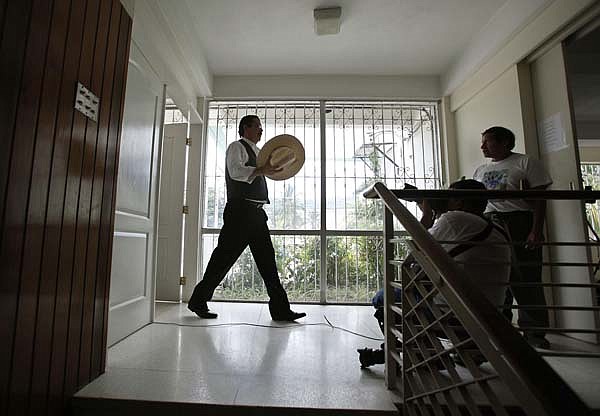TEGUCIGALPA, Honduras — The general who oversaw the ouster of President Manuel Zelaya implored all sectors of Honduran society to join in resolving the country's deepening crisis Tuesday.
Gen. Romeo Vasquez's comments on Channel 5 television came hours after interim President Roberto Micheletti said he would accept congressional calls for him to reverse an emergency decree suspending civil liberties that he had announced Sunday.
On Tuesday, two critical broadcasters remained shuttered and police faced off with about 500 demonstrators who sat in the middle of a street after officers blocked them from marching.
Micheletti also said he would allow an Organization of American States team whose arrival was blocked this weekend. The organization hopes to persuade the coup leaders to bow to demands they reinstate Zelaya, who was arrested and expelled from the country on June 28.
Interactive
http://hosted.ap.or…">See a photogallery from Honduras
The decree suspended freedoms of speech and assembly and allowed no-warrant arrests.
Officials also closed dissident television and radio stations and expelled OAS employees.
"I am sure that Hondurans will find a peaceful solution soon to the crisis we are facing," Vasquez said, adding that "All sectors of society should put aside their differences tounite the homeland."
Zelaya, speaking via telephone to a United Nations General Assembly meeting in New York, said the decree was proof that the interim government "is a fascist dictatorship that has repressed the Honduran people."
The interim government said the measures were needed to counter calls for an uprising by Zelaya's supporters ahead of the three-month anniversary of the June 28 coup.
The reversals came in a roller-coaster 24 hours.
Micheletti first gave the Brazilian government a 10-day ultimatum to get rid of Zelaya - who has been holed up at the Brazilian Embassy in Tegucigalpa since sneaking back into the country Sept. 21 - warning Brazil itwould have to take down its flag and remove the embassy crest.
Then on Monday, Micheletti said he wanted to send "a big hug" to Brazil's president and pledged nothing would happen to the diplomatic mission.
Micheletti also announced late Monday that he would soon cancel the measures and that an OAS delegation would be welcome to help mediate talks scheduled for early October.
Micheletti said his decision came after talking to congressional leaders, who were concerned about the decree's effect on the November presidential election, in which all the major candidates oppose Zelaya's policies.
Costa Rican President Oscar Arias, who mediated U.S.-backed talks between the two sides, commended Micheletti for saying he would reverse the decree, but he criticized him for refusing to budge on reinstating Zelaya.
Speaking at a business forum in Miami, Arias said Micheletti "has not moved an inch" in negotiations to return Zelaya to power with limited authority - a plan brokered by Arias. He warned that the results of the November presidential election in Honduras will not be recognized unless the terms of his San Jose Accord aremet.
The decree was declared as Zelaya called for a "final offensive" against the government, and Micheletti said pro-Zelaya media outlets were calling for violence.
One of the closed broadcasters, Radio Globo, was transmitting on the Internet on Tuesday, a day after police raided its offices and confiscated equipment.
Throughout three months, demonstrations by both sides have been largely peaceful. The government says three people have been killed since the coup, while protesters put the number at 10.
Information for this article was contributed by Mark Stevenson of The Associated Press.
Front Section, Pages 6 on 09/30/2009

